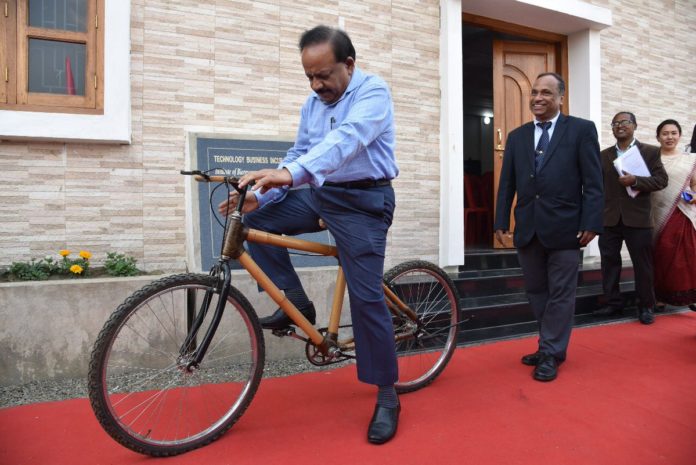India will contribute 200,000 US dollars to the South East Asia Health Emergency Response Fund
India has decided to contribute 200,000 US dollars to the South East Asia Health Emergency Response Fund.
“I am very happy to announce that India will contribute 200,000 US dollars towards implementation of the preparedness stream under the South East Asia Health Emergency Response Fund (SEARHEF), and we will release this support at the earliest,”Dr Harsh Vardhan, Union Minister of Health and Family Welfare said during the Ministerial Roundtable on Emergency Preparedness on day 2 of the ‘72nd Session of the WHO Regional Committee for South-East Asia’. The Health Ministers of the South-East Asia Region of WHO also signed the Delhi Declaration on Emergency Preparedness.
Earlier in the morning, Dr Harsh Vardhan, accompanied by Dr Bernard Schwartlander, Chef de Cabinet, WHO and Ms Dechen Wangmo, Minister of Health, Royal Govt. of Bhutan, cycled to the meeting venue to focus on strengthening promotive and preventive health so that people adopt positive and healthy lifestyles. Later, Dr Harsh Vardhan also led the yoga session at the venue where the Health Ministers from eight of the 11 SEARO countries and delegates practiced yoga.
“Special surveillance was mounted for early detection and control/containment of vector-borne and waterborne diseases. There had been no outbreak of epidemic prone disease following cyclone Fani”
The Health Ministers and delegates also went for cycling after the yoga session. He said that thePrime Minister of India, Narendra Modi gave a call at the United Nations General Assembly to recognize Yoga as a provider of holistic approach to health and well-being. “We are happy that the UN General Assembly adopted a resolution to observe 21st June as the International day of Yoga, he stated. This, along with Eat Right India campaign, will help us to fight lifestyle diseases like hypertension, obesity and diabetes effectively”, he added. He further said that Prime Minister Narendra Modi has recently launched the Fit India Movement and has urged all Indians to make fitness part of their daily routine.
Highlighting Cyclone Fani as a case study in early preparedness and disaster management, Dr Harsh Vardhan stated that accurate weather prediction, effective early warnings, sturdy preparedness for timely evacuation of nearly 1.15 million people to 6575 cyclone shelters, combined with other risk mitigation measures helped to save many human lives. “Special surveillance was mounted for early detection and control/containment of vector-borne and waterborne diseases. There had been no outbreak of epidemic prone disease following cyclone Fani,” Dr Harsh Vardhan said.
He added that the whole exercise of accurate prediction of cyclone Fani and saving thousands of human lives was appreciated and acknowledged by the United Nations and many other international agencies. Enumerating the emerging challenges, the Union Health Minister said climate change is leading to extreme weather events and sudden onset of natural disasters. The earlier concept of disaster risk mapping is rapidly getting blurred with large sections of hitherto unexposed population getting vulnerable to natural and manmade hazards. This calls for requisite systems strengthening.
Eight Ministers of Health from 8 of the 11 countries of the WHO South East Asia Region (SEAR), Dr Poonam Khetrapal Singh, Regional Director, WHO South-East Asia Region and senior officers of the Health Ministry were also present at the Ministerial Roundtable. This is the second time that India is hosting the Regional Committee meeting; the previous one was also hosted by India in New Delhi.


